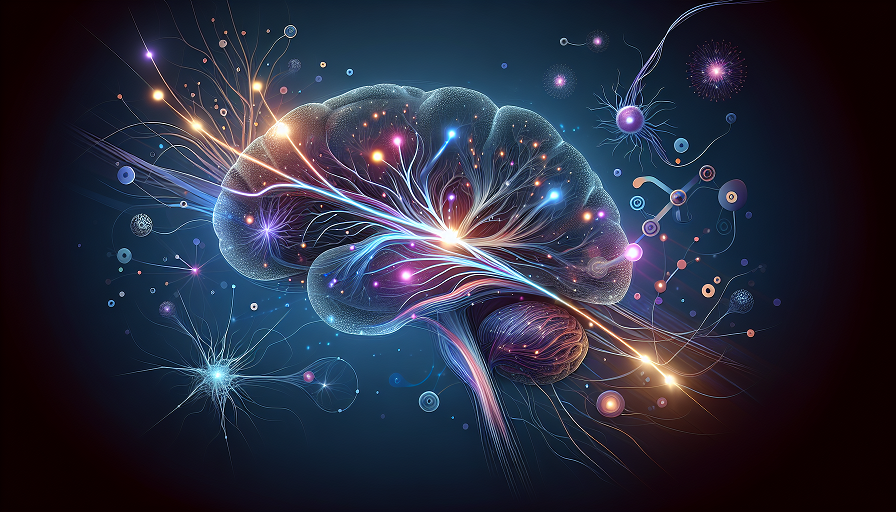In our fast-paced modern world, stress has become a common part of daily life. While short-term stress can be a normal and even beneficial response to challenging situations, chronic stress can have serious consequences for your brain health. Over time, prolonged exposure to stress can lead to cognitive decline, mental health issues, and even changes in brain structure. Understanding how chronic stress affects your brain and learning strategies to manage it can help you protect your mental and cognitive well-being. In this article, we will explore the impact of chronic stress on brain health and provide actionable steps you can take to mitigate its effects.
The Science Behind Chronic Stress and the Brain
Chronic stress triggers a complex response in the brain and body, involving the release of stress hormones and activation of the nervous system. This response, while useful in short-term situations, can become harmful when it is sustained over time.
The Stress Response: Fight or Flight
When you encounter a stressful situation, your body’s “fight or flight” response is activated. This involves the release of stress hormones like cortisol and adrenaline, which prepare your body to respond to the perceived threat. Your heart rate increases, blood pressure rises, and your senses become sharper. While this response can be lifesaving in dangerous situations, it becomes problematic when activated frequently due to chronic stress.
Chronic Stress and Cortisol
Cortisol, often referred to as the “stress hormone,” plays a key role in the body’s response to stress. Under normal circumstances, cortisol levels rise during stressful events and then return to baseline once the situation has passed. However, in cases of chronic stress, cortisol levels remain elevated for extended periods. Prolonged exposure to high cortisol levels can have damaging effects on the brain, including impairing cognitive function, weakening memory, and increasing the risk of mental health disorders.
Impact on Brain Structure and Function
Chronic stress can lead to changes in brain structure and function, particularly in areas such as the hippocampus, prefrontal cortex, and amygdala. The hippocampus, which is responsible for memory and learning, can shrink due to prolonged exposure to cortisol, leading to memory problems and difficulty concentrating. The prefrontal cortex, which is involved in decision-making and emotional regulation, can also be negatively affected, leading to impaired judgment and increased anxiety. Meanwhile, the amygdala, which is associated with fear and emotional responses, can become overactive, contributing to heightened stress and emotional reactivity.
Cognitive and Emotional Consequences of Chronic Stress
The effects of chronic stress extend beyond changes in brain structure; they also manifest in cognitive and emotional challenges that can significantly impact daily life.
Memory Impairment
One of the most well-documented effects of chronic stress is memory impairment. As the hippocampus shrinks due to prolonged cortisol exposure, the brain’s ability to form and retrieve memories becomes compromised. This can result in forgetfulness, difficulty recalling information, and challenges with learning new material. Memory problems related to chronic stress can affect both short-term and long-term memory, making it harder to function effectively in everyday tasks.
Reduced Cognitive Flexibility
Cognitive flexibility, the ability to adapt to new information and switch between tasks, is essential for problem-solving and decision-making. Chronic stress can impair cognitive flexibility, making it more difficult to adjust to changing circumstances and think creatively. This can lead to rigid thinking patterns, decreased productivity, and an increased likelihood of making mistakes under pressure.
Anxiety and Depression
Chronic stress is a major contributor to the development of anxiety and depression. The constant activation of the stress response can lead to persistent feelings of worry, fear, and hopelessness. Over time, the chemical imbalances caused by chronic stress can exacerbate these mental health issues, leading to a cycle of increased stress and worsening symptoms. Anxiety and depression, in turn, can further impair cognitive function and reduce overall quality of life.
Emotional Dysregulation
Emotional regulation, or the ability to manage and respond to emotional experiences in a balanced way, can be significantly disrupted by chronic stress. As the prefrontal cortex becomes impaired, individuals may find it more difficult to control their emotions, leading to increased irritability, mood swings, and emotional outbursts. This emotional dysregulation can strain relationships and contribute to feelings of isolation and frustration.
Long-Term Risks of Untreated Chronic Stress
If left unaddressed, chronic stress can lead to long-term health issues that extend beyond the brain, affecting overall physical and mental well-being.
Increased Risk of Neurodegenerative Diseases
Chronic stress has been linked to an increased risk of neurodegenerative diseases such as Alzheimer’s and Parkinson’s. The ongoing damage to the hippocampus and other brain regions can accelerate the decline in cognitive function and contribute to the progression of these conditions. By managing chronic stress, you may be able to reduce your risk of developing such diseases later in life.
Cardiovascular Problems
The stress response involves a significant increase in heart rate and blood pressure, which, over time, can contribute to cardiovascular issues such as hypertension, heart disease, and stroke. Chronic stress can also lead to unhealthy behaviors, such as poor diet, lack of exercise, and substance abuse, which further exacerbate the risk of cardiovascular problems.
Immune System Suppression
Prolonged exposure to stress hormones can weaken the immune system, making the body more susceptible to infections and illnesses. Chronic stress can reduce the effectiveness of the immune response, leading to slower recovery times and an increased likelihood of developing chronic health conditions. Maintaining a healthy immune system is crucial for overall well-being, and managing stress is a key component of immune health.
Strategies to Manage and Reduce Chronic Stress
While the effects of chronic stress on brain health can be serious, there are effective strategies to manage stress and protect your cognitive and emotional well-being.
Mindfulness and Meditation
Mindfulness and meditation are powerful tools for managing stress and improving brain health. These practices involve focusing on the present moment, observing thoughts and feelings without judgment, and cultivating a sense of calm and relaxation. Regular mindfulness and meditation practice can help reduce cortisol levels, enhance emotional regulation, and improve cognitive function. Start with just a few minutes each day and gradually increase the duration as you become more comfortable with the practice.
Physical Activity
Regular physical activity is one of the most effective ways to combat stress and support brain health. Exercise helps reduce stress hormones, increase endorphins (the body’s natural mood elevators), and improve sleep quality. Activities such as walking, jogging, yoga, and strength training can all contribute to stress reduction and overall well-being. Aim for at least 30 minutes of moderate exercise most days of the week to reap the benefits for your brain and body.
Healthy Diet and Nutrition
Your diet plays a crucial role in managing stress and supporting brain health. Eating a balanced diet rich in fruits, vegetables, whole grains, lean proteins, and healthy fats can provide the nutrients your brain needs to function optimally. Certain foods, such as those high in omega-3 fatty acids, antioxidants, and B vitamins, are particularly beneficial for brain health and can help reduce the impact of stress. Additionally, supplements such as ashwagandha, staying hydrated and limiting caffeine and sugar intake can help maintain stable energy levels and reduce stress.
Quality Sleep
Sleep is essential for brain health and stress management. Chronic stress can disrupt sleep patterns, leading to insomnia or poor-quality sleep, which in turn exacerbates stress and cognitive decline. Prioritize good sleep hygiene by maintaining a consistent sleep schedule, creating a relaxing bedtime routine, and ensuring your sleep environment is conducive to rest. Aim for 7-9 hours of quality sleep each night to support brain function and reduce stress.
Social Support and Connection
Strong social connections are vital for managing stress and maintaining mental health. Spending time with friends, family, or support groups can provide emotional support, reduce feelings of isolation, and offer opportunities for positive social interactions. Engaging in meaningful conversations, sharing your experiences, and seeking advice from trusted individuals can help alleviate stress and enhance your overall well-being. If in-person connections are difficult, consider virtual meetups or online communities to maintain social support.
Seeking Professional Help When Needed
In some cases, managing chronic stress may require professional intervention. If you find that stress is overwhelming or significantly impacting your daily life, it’s important to seek help from a mental health professional.
Counseling and Therapy
Therapy can be highly effective in helping you manage stress and its effects on brain health. Cognitive-behavioral therapy (CBT), for example, can help you identify and change negative thought patterns that contribute to stress. Other therapeutic approaches, such as mindfulness-based stress reduction (MBSR) and acceptance and commitment therapy (ACT), can also be beneficial. A therapist can work with you to develop coping strategies, improve emotional regulation, and address the underlying causes of chronic stress.
Medication
In some cases, medication may be necessary to manage the symptoms of chronic stress, particularly if it has led to anxiety or depression. A healthcare provider can evaluate your situation and prescribe medication if appropriate. It’s important to use medication as part of a comprehensive treatment plan that includes therapy, lifestyle changes, and stress management techniques.
Integrative and Complementary Approaches
In addition to traditional therapy and medication, integrative approaches such as acupuncture, massage therapy, and herbal supplements can complement your stress management plan. These approaches may help reduce stress, promote relaxation, and improve overall well-being. Always consult with a healthcare provider before starting any new treatment to ensure it is safe and appropriate for your needs.



